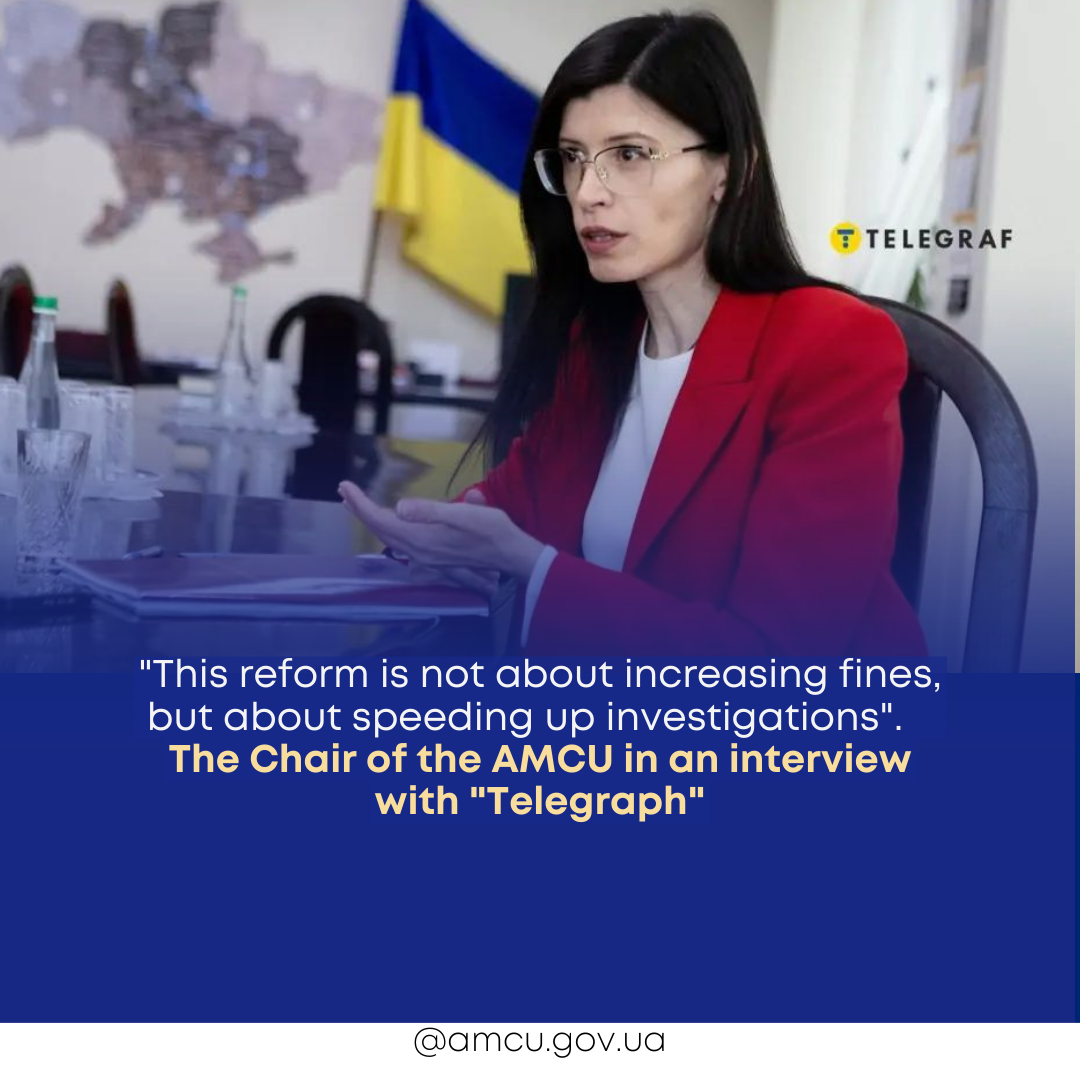"This reform is not about increasing fines, but about speeding up investigations". The Chair of the AMCU in an interview with "Telegraph"
Olha Pishchanska, the Chair of the Antimonopoly Committee of Ukraine, spoke in an interview with the "Telegraph" about the changes to be expected after the start of the antitrust reform and, in particular, about the novelties of the draft law No. 5431.
According to her, the adoption of the draft law by the Parliament and its entry into force will improve the AMCU's working tools, expand opportunities for collecting information and evidence, and allow it to devote more time to analytical work in the framework of case consideration and research. At the same time, the Chair of the AMCU noted that the most controversial issues during the initial approval of the draft law were the rules on inspections: at enterprises and in the possessions and residences of business executives and employees.
"The AMCU's position on this issue has always been clear: there must be a court order to inspect the homes and properties of individuals. This, among other things, is directly required by European law. Above, we talked about inspections of companies directly, and this provision remains in the draft law. As for individuals, most stakeholders - the business community, specialized associations, and legal community - strongly opposed this provision, expressing concerns about possible abuse. Their comments were taken into account, and it was decided to postpone the inspections of individuals for the future. So now the draft law does not contain this provision," said the Chair of the AMCU. At the same time, she emphasized that most competition authorities in the world have the right to inspect private property if there are reasonable suspicions that they are concealing evidence.
As for inspections of undertakings, the AMCU still has the authority to conduct them, said Olha Pishchanska. According to her, the reform will detail this tool, which will strengthen business rights: "The procedure will be clearly defined: who, how, in what composition and when can inspect enterprises. Currently, these aspects are not regulated in detail, and the AMCU supports the need to enshrine the procedural rights and obligations of all parties at the legislative level."
Among the important innovations of the reform, the Chair of the AMCU noted the introduction of the concept of joint and several liability, which will significantly reduce the possibility of avoiding liability for violations.
"Currently, a player who has violated competition law can simply close or go bankrupt, so that it is not the company that can be fined or charged in court. Then he creates a new company, and it violates the law again. This is an old scheme, which is especially often used in procurement collusions or in large cases where multimillion-dollar fines are at stake," explained Olha Pishchanska. In her words, if the draft law is passed, even if the offending company is unable to pay the fine for some reason, it will be paid by a group associated with its main owner, including the offender's legal successor and founders.
In general, according to Olha Pishchanska, the reform of competition law significantly brings the relevant legal framework of Ukraine closer to European standards, strengthens the protection of fair business and speeds up the detection of violations:
"This reform is not about increasing fines, but about speeding up investigations, quickly terminating violations, and quickly restoring balance to the market. I was once asked: "Why doesn't the Antimonopoly Committee fine the entire 10% of the company's annual income every time?" (The maximum penalty.) We do not aim to correct the market by removing an undertaking from it or blocking its work... Our goal is to make the defendant stop violating the law, get on the right track, and protect the injured party... We analyze the situation and have to create the most comfortable conditions for business, reduce barriers to entry into markets. This is our task," summarizes the Chair of the AMCU.
Other details of the first part of Olha Pishchanska's interview with "Telegraph" are available at this link.
Earlier, the Chair of the AMCU emphasized that the concept of competition law reform underlying Draft Law No. 5431 was developed by MPs with the participation of international partners from Twinning and the FTC. The draft law was supported by the Delegation of the European Union to Ukraine in a letter.
